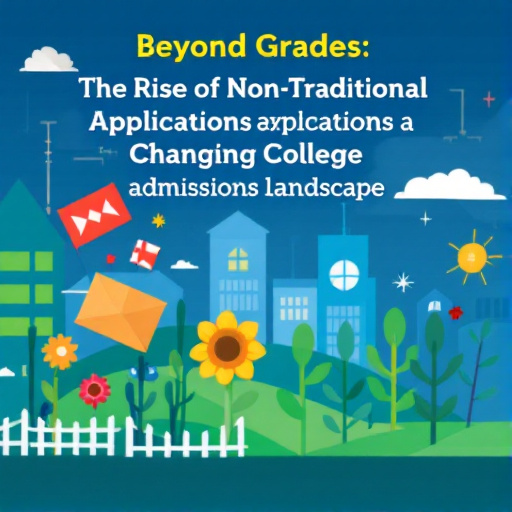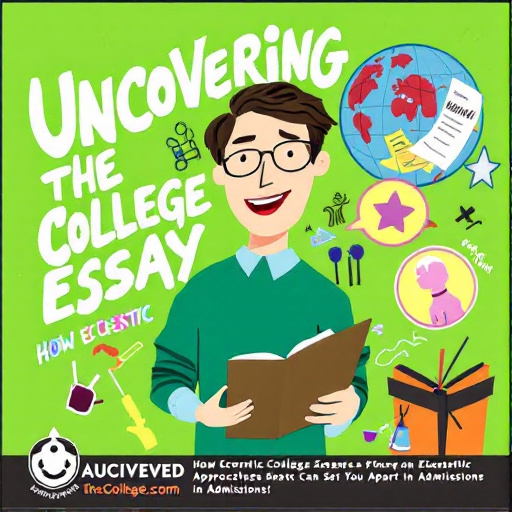Featured Articles
- 5 Unexpected Financial Aid Secrets Every College Applicant Must Know Before You Submit
- "Beyond Grades: How Mental Health Spaces Are Shaping College Applications in 2023"
- "Beyond Grades: The Rise of Non-Traditional Applications in a Changing College Admissions Landscape"
- Beyond the Basics: How TikTok Influencers are Shaping College Application Trends in 2023
- The Hidden Cost of College Applications: How Mental Health Influences Admission Success
"Beyond Grades: The Rise of Non-Traditional Applications in a Changing College Admissions Landscape"
"Beyond Grades: The Rise of Non-Traditional Applications in a Changing College Admissions Landscape"
As college admissions evolve, students are shifting their focus from traditional metrics like grades and test scores to more holistic and unique forms of applications. This new landscape offers a wider array of opportunities for showcasing creativity, skills, and individual narratives.
Introduction: The Changing Tide of College Admissions
The college admissions process used to be a straightforward affair: grades, standardized tests, and a dash of extracurriculars. But times are changing, and the traditional 'checklist' approach is giving way to more nuanced applications reflecting the individual journeys of applicants. The question on everyone’s mind now is: do grades really tell the whole story?
The Rise of Holistic Admissions
In recent years, many colleges have adopted a more holistic admissions process, meaning they consider a variety of factors beyond GPAs and standardized test scores. According to the National Association for College Admission Counseling (NACAC), nearly 40% of colleges reported that they granted more weight to subjective factors, such as personal essays and interviews, than to standardized testing in their admissions decisions in 2021.
This inclusive approach helps schools uncover hidden talents or experiences that standard metrics might overlook, ensuring a more diverse and dynamic student body. For instance, universities like the University of California system have eliminated standardized test requirements altogether, emphasizing the need to evaluate students based on their unique contributions, personal challenges, and commitment to community.
Storytelling as an Admissions Strategy
Let’s take a moment to appreciate the power of storytelling. A well-crafted personal narrative can make an application stand out in a sea of perfect GPAs. Consider the case of Sarah, a high school senior who struggled with significant family responsibilities while maintaining her grades and pursuing art. In her application, she dedicated a portion of her personal essay to how these experiences shaped her identity and passions.
Universities are increasingly recognizing that students like Sarah often demonstrate resilience, creativity, and the ability to think outside the box—qualities that make them valuable assets to campus communities.
Beyond Essays: Innovative Application Materials
In addition to written narratives, many rising seniors are experimenting with unconventional application materials. Video essays, for instance, have become a popular medium for students to express their personality and creativity. High school student Alex made waves with a quirky, well-edited YouTube video that showcased his hobbies, passions, and ambitions, leading to an acceptance at a competitive art school.
Data suggests that nearly 15% of students submitted video or multimedia content as part of their applications in the 2022 admissions cycle, according to a survey conducted by Education Commission of the States (ECS). This indicates a growing trend among applicants to think outside the box and utilize diverse platforms to tell their stories.
The Role of Extracurricular Activities
Extracurricular activities also play a crucial role in showcasing a student’s non-academic talents and interests. In 2023, a study by the Pew Research Center reported that over 80% of college admissions officers consider leadership roles and commitment in extracurricular activities as influential in their decision-making process. Whether through sports, volunteer work, or creative pursuits, students have plenty of opportunities to demonstrate their individuality outside the classroom.
Consider the example of a student who started a community garden to help local families gain access to fresh produce. Not only does this demonstrate initiative, but it also speaks volumes about the applicant’s values and commitment to social issues—something that resonates with admissions committees.
Statistics on the Evolving Admissions Landscape
Let’s break it down numerically: According to a 2021 report from Inside Higher Ed, about 70% of colleges modified their admissions processes due to the COVID-19 pandemic. This led to the acceptance of pass/fail grades, a reduction in reliance on standardized testing, and an increased emphasis on community service, creativity, and unique personal experiences. These changes reflect a fundamental shift toward valuing a broader skill set beyond traditional academic achievements.
Case Studies: Colleges Leading the Charge
Some institutions are at the forefront of this change. Take Hampshire College in Massachusetts, for instance. The college abolished standardized testing as a requirement and instead evaluates applicants based on essays and interviews focused on their personal journeys. Their admissions team believes that grades are not a definitive measure of a student’s potential for success in college and beyond.
Similarly, the Bard College Early College model incorporates real-world experiences and diverse curricula, allowing young scholars to delve into subjects that intrigue them, rather than limiting themselves to a predefined set of courses that meet traditional academic standards. Bard’s approach has garnered attention for yielding well-rounded graduates equipped with the skills needed to navigate our complex world.
A New Perspective on Failure
Failure, often seen as a hindrance in a student's record, can also be an important aspect of the college application process. Here’s the twist: failure can provide depth and character. Take Jack, who faced repeated challenges during his high school years but learned perseverance when he finally established a successful online tutoring business. His narrative of overcoming failures and gaining grit impressed admissions officers, leading to his acceptance at a competitive university.
This evolving perspective encourages students to embrace their imperfections and utilize them as a growth narrative—allowing for a more relatable and believable application that resonates with the admissions team.
The Importance of Self-Reflection in Applications
Self-reflection has become integral to the application process, with students increasingly focusing on their beliefs, goals, and motivations. According to a study by the Educational Testing Service (ETS), 75% of students admitted to top colleges highlighted their personal reflections as crucial aspects of their application. It's becoming clear: admissions committees want to understand the “why” behind student pursuits.
Creative Solutions: Embracing Challenges
Let’s talk creativity. As the college application journey becomes more complex, innovative solutions have arisen. Some high school seniors have ventured into creating portfolios that include art, literature, or personal projects—they use these portfolios in lieu of traditional academic accolades. Such creative endeavors allow students to present a multifaceted view of their capabilities and experiences.
Organizations, such as the Common App and Coalition for College Access, have started integrating options for students to showcase imaginative presentations of their skills and activities. By promoting creativity, these organizations are paving the way for a more inclusive application landscape.
The Flip Side: Risks of Non-Traditional Applications
While non-traditional applications present unique opportunities, they also come with risks. The lack of standardization can lead to challenges in how admissions officers assess applicant potential. For example, a quirky video might not resonate with every committee, and what one school sees as innovative, another could perceive as frivolous. Thus, navigating the balance between creativity and professionalism remains a delicate task for applicants.
Moreover, the reliance on subjective narratives can amplify biases, despite the intent to reduce reliance on grades. Research from the University of Southern California indicates that subjective impressions can influence decisions based on unconscious biases related to race, gender, or socioeconomic background. As such, both students and admissions teams must remain vigilant against the pitfalls of a non-standard approach.
How Families Can Support Non-Traditional Applicants
With all this in mind, how can families support aspiring college students as they navigate this new admissions landscape? The answer lies in encouragement and openness to exploration. Kids should feel free to pursue passions without the weight of needing a perfect GPA.
Parents can foster resilience and support creativity by encouraging their children to engage in projects that genuinely interest them. Family discussions about life's lessons, both successes and failures, help establish a grounded outlook on the application process. A supportive environment can empower students to think independently and authentically, ultimately elevating their applications.
Staying Informed: The Future of Admissions
As college admissions continue to evolve, staying informed about trends and changes becomes essential for applicants. Institutions regularly update their admissions guidelines and practices, so prospective students should remember to seek the latest insights. Apps and blogs dedicated to college admissions can be incredibly helpful resources in navigating the labyrinthine world of forms and interviews.
Moreover, networking with current students or alumni can provide invaluable perspectives, shed light on what specific schools value, and help budding college hopefuls understand the diverse facets of their own experiences.
Conclusion: A Brave New World for Applicants
The evolution toward non-traditional applications in college admissions is not just a trend—it reflects a deeper understanding of student potential and diversity. For the class of 2024 and beyond, getting into college can take many shapes and forms, from video portfolios to heartfelt narratives of resilience. This brave new world invites young people to embrace their uniqueness and redefine what it means to be a prospective college student.
As we wave goodbye to a rigid admissions framework based solely on grades, we wave hello to a plucky new generation of creative thinkers, resilient learners, and dynamic individuals ready to redefine the future of academia. Together, let’s venture beyond grades, fostering a society that values all aspects of human potential.




